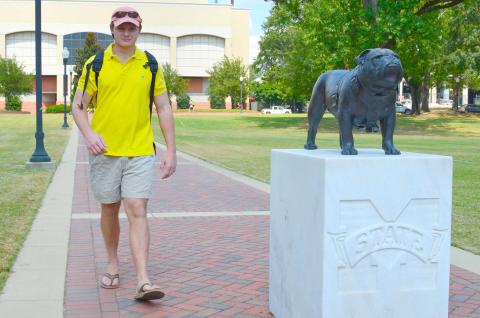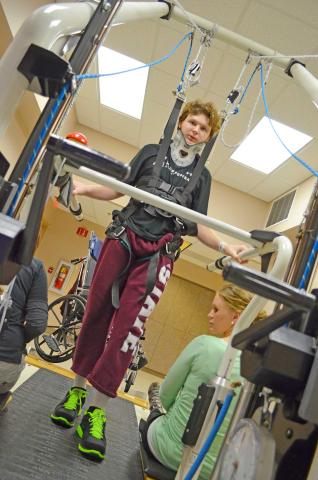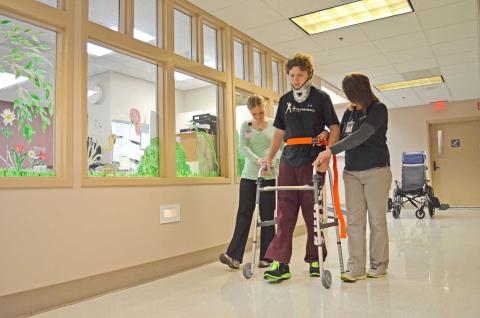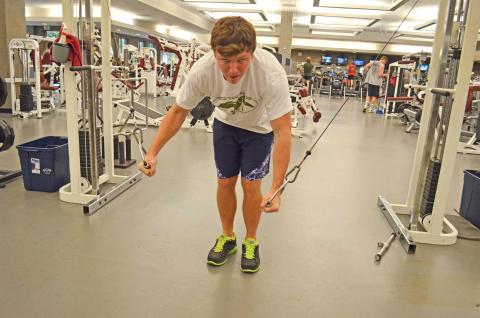
A year after the auto accident that killed one Flora teen and injured five, survivor Trainor Storey has bounced back from a spinal cord injury to further his education at Mississippi State




He goes to class, studies hard, hits the gym, cheers on the Bulldogs on game day and even finds a little time to party in the Cotton District.
Trainor Storey rarely stands still, like most 20-year-old students at Mississippi State University.
But just a year ago, his life was at a standstill.
He and six of his close Tri-County Academy friends were catching up while back at home for Christmas break on the night of December 27, 2012. They all piled into the cab of a truck to call it a night. They had just dropped off one friend and were on the way to Rachel Hillman’s home around 2 a.m.
“I was in the back seat not really paying attention,” Trainor said. “I heard Tyler (Renicker) yell, felt the truck swerve really hard, then I don’t remember anything but waking up on the ground. I couldn’t move anything but some toes on my left foot. I tried to get up and help my friends, but I couldn’t.”
The truck had run off the road on Mississippi 22 and flipped, ejecting all of its passengers. Hillman died at the scene. Trainor and Renicker, along with Steven Cumberland, Anna Flowers and Kaysie Bennett, were all badly injured but still alive. None of them had on their seat belts. It was over an hour before they were found and help arrived.
The tragedy left their close-knit Flora community in shock but eager to lend support.
“I was asleep in bed and I’m a very deep sleeper,” said Trainor’s mother Marilyn Storey. “At 5:30 a.m., the mayor of Flora had called me, but I didn’t pick up. When I awoke at 6, there were all these messages from everyone asking about Trainor and I was freaking out. As soon as I found out what was going on, I raced to the hospital. When I got there, the waiting room at the ER was already packed full of people from Flora.”
Trainor and the others were taken to the University of Mississippi Medical Center emergency room. He had sustained a spinal cord injury that completely shattered one of his vertebrae and severely damaged three others.
“Trainor had on a brand new shirt and pair of jeans he had gotten for Christmas, and when I saw him he was so upset that they had to cut them off,” Marilyn said. “He was worried about that, but he couldn’t move! He could breathe and he could talk. He was in a lot of pain.”
Trainor underwent emergency spinal surgery the next day. After a week recovering, the decision needed to be made where Trainor would rehab.
Prior to the accident, Trainor’s father, Conor Storey, had become acquainted with Joel Shows at Paul Lacoste Sports in Ridgeland, where they both exercise. Shows, a registered nurse, was working as an outreach representative for Methodist Rehab.
“I decided on Methodist Rehab based on support I received from my friend Joel, as well as the stellar reputation of Methodist that was repeated by everyone I talked to about rehab facilities,” Conor said.
“Just about everyone who came to visit me said I should go to Methodist,” Trainor said.
That couple of toes Trainor could move at the accident scene was a good sign of things to come, as strength was returning to his legs as he checked in to Methodist.
“When they tried to get him to walk at UMC, it was scary,” Marilyn said. “I was like, ‘We have such a long way to go.’ But the very fact he was even up and trying to walk was encouraging.”
Upon arriving at Methodist Rehab, medical director Dr. Sam Grissom offered more hope.
“It was very important in talking with Trainor and his mom up front to give them that encouragement that the prognosis was very favorable,” Grissom said. “He had an incomplete injury. That means he had some sensation or some motor movement, particularly in his legs.
“His injury is something that we call a Central Cord Syndrome (CCS). With such an injury, patients tend to have more paralysis or weakness in the upper extremities.”
CCS is an injury most associated with elderly patients who have suffered falls. It is usually caused by a hyperextension of the neck, which Trainor likely suffered by not being properly restrained in the vehicle.
With Trainor’s legs responding well, it was crucial to begin rehab immediately.
“We concentrated on areas where he had neurologic improvement and that we felt were going to continue to improve so that we could maximize his functional recovery and level of independence,” Grissom said. “If things are recovering quickly, then you tend to have a more complete recovery.”
Trainor’s sports background and can-do attitude became an asset in the therapy gym.
“I treated it like a competition—to go in there and try and do better than I did the day before,” he said.
His competitive spirit really came through in recreational therapy. Early on, he shot pool after therapist Courtney Jones taped the stick to his hands which were too weak to grip it properly.
“She said, ‘What should your goal be, Trainor? Make ten shots?’” Marilyn said. “And he was like, ‘Heck no, I’m going to run the table!”
To help with Trainor’s weak hands, Jones bought a Nerf dart gun and a bullseye. The toys encouraged his competitive nature, while the trigger-pulling strengthened his right hand.
“I could see how everything was designed to strengthen my muscles because I used to lift weights for football,” Trainor said.
Trainor left inpatient care walking on his own, thanks in part to the time spent on the hospital’s weight-supporting treadmill system. The therapy helped him maintain proper gait and balance as the strength in his muscles came flowing back.
Near the end of his inpatient stay, Trainor was visited by an old family friend who knew Methodist Rehab quite well.
“When I was a senior at Jackson Prep in 1977, a very good friend of mine was in a bad auto accident,” Marilyn said. “He had a massive brain injury and nearly died at the scene. After months in the ICU, he came to Methodist Rehab. I would come and literally sit with him for hours.”
Her friend, Whit Bain, recovered from the accident and eventually went on to a career as a bodybuilder. He drove from his home in Plano, Texas, to visit Trainor and share his story of recovery to provide inspiration.
When Trainor walked unassisted in the hospital’s Wilson Foundation annual Walk & Roll fundraiser in April, many that knew him from his stay were amazed at his progress. But he still had work to do to on his upper body, and that’s where Methodist Rehab Outpatient Services came in.
“What I had the most trouble with was my right arm,” Trainor said. “It probably wasn’t functional until I had been at outpatient for a few weeks. It was like trying to start from below zero and come back to normal.”
Occupational therapist Suzanne Colbert believes dedication to continued recovery is crucial in the outpatient setting, something Trainor had no shortage of.
“He was very motivated, a real go-getter,” Colbert said. “So whatever I gave him here, he doubled or tripled it at home. He did the homework, which a lot of times is what it comes down to.”
Colbert helped strengthen Trainor’s right arm by using the types of exercises he could perform on his own, using free weights, pulleys and exercise bands.
“Now it’s completely functional,” Trainor said. “As far as writing for school, well, it’s probably just as neat as it used to be—I never had good handwriting.”
Trainor continues on his recovery by working out at the MSU’s fitness complex, the Sanderson Center.
“The whole right side of my body is still a little weak, mainly my upper body,” Trainor said. “Even the abs on the right side of my body are smaller than on the left side. It’s pretty wild. I can look in the mirror and see the difference.”
Trainor attended East Mississippi Community College at the time of the accident, but it had always been his plan to transfer to MSU and major in chemical engineering. He says in the spring he will be the equivalent of a first-semester junior, but he’s already planning ahead for after graduation.
“I’m trying to get a co-op job somewhere working for a chemical company in the spring semester,” Trainor said. “There’s a real good chance that they would hire me on after I graduate.”
It’s uncommon to meet a college sophomore who has such a laser-like focus on the future. But that’s Trainor Storey—always looking forward with the sunny optimism that helped carry him through his miraculous recovery.
“He has an indomitable will, that’s for sure,” Marilyn said. “Back when we were at the ICU and I was going through a rough time, he said, ‘Don’t worry mom, I’m going to be fine.’
“All the while he had no doubts that he was going to be fine.”
For more information on Methodist Rehab’s Spinal Cord Injury Program, call 601-364-3498.
